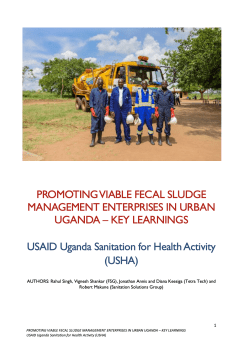With an urbanization rate of 5.6% (World Bank 2021), Uganda’s urban population is expected to nearly double between 2018 and 2050, placing considerable strain on the country’s sanitation infrastructure. Currently, only 2% of urban households are connected to a sewer line, with the rest relying on on-site sanitation facilities. As a result, the provision of safe and affordable pit-emptying services is a growing need in urban areas.
In 2018, FSG began working with the Uganda Sanitation for Health Activity (USHA)—a five-year program funded by the United States Agency for International Development (USAID)—to design and implement novel approaches to increase access to basic sanitation. A key goal of USHA was to increase access to safe fecal sludge management (FSM) services in select urban areas of Uganda. FSG supported USHA in designing and implementing a suite of market-based FSM interventions focused improving the business models of existing FSM entrepreneurs (FSMEs) thereby enabling them to provide sustainable and safe pit emptying services, while increasing the volumes of fecal sludge reaching treatment plants.
As a result of these interventions, between March 2020 and September 2022, USHA’s partner FSMEs were able to provide safe emptying services to a total of 1,216 unique customers. When considering jobs for repeat customers, the FSMEs collectively emptied an estimated 13 million liters of sludge. Three of the six FSMEs USHA partnered with accounted for 86% of the total unique customers and 87% of sludge emptied. Through their partnership with USHA, these three FSMEs were able to increase the number of customers they served per year despite several challenges, including profitability.
This document describes the FSM interventions USHA developed and implemented with support from FSG, their impact on partner FSMEs, persisting challenges, and steps USHA took to address these challenges. It also outlines key learnings based on USHA’s experience in the hope that these findings will be useful for other implementers looking to introduce market-based FSM interventions in Uganda.

